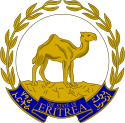Elections in Eritrea
 |
|---|
| Constitution (not enforced) |
| Elections |
|
|
There have not been national elections in Eritrea since independence in 1993.
National government
The
Eritrean national elections were set for 1997 and then postponed until 2001, it was then decided that because 20% of Eritrea's land was under occupation that elections would be postponed until the resolution of the
The most recent round of local government elections were held in May 2003, though to the present Eritrea has failed to hold any national elections.On further elections, the President's Chief of Staff, Yemane Ghebremeskel said,
"The electoral commission is handling these elections this time round so that may be the new element in this process. The national assembly has also mandated the electoral commission to set the date for national elections, so whenever the electoral commission sets the date there will be national elections. It’s not dependent on regional elections, although that might be a very helpful process.
Multipartyism, in general principle yes, it is there but the law on political parties has to be approved by the national assembly. It was not approved the last time. The view from the beginning was that you don’t necessarily need a party law to hold national elections. You can have national elections and the party law can be adopted at any time. So in terms of commitment it’s very clear, in terms of the process it has its own pace, its own characteristics."[6]
President

Regional elections
Regional and local elections for regional assemblies and local courts took place in all regions of Eritrea in December 2002 and May 2004.[8] The polls were considered free and fair by the National Elections Commission.[9]
See also
- Electoral calendar
- Electoral system
References
- Foreign Policy.
- ^ "Does Eritrea Need National Elections". Madote. 4 April 2014. Retrieved 18 December 2017.
- ^ V-Dem Institute (2023). "The V-Dem Dataset". Retrieved 14 October 2023.
- ^ Democracy Report 2023, Table 3, V-Dem Institute, 2023
- ^ "Regional Elections That Reflected the Political Maturity of the People". Archived from the original on 2007-09-27. Retrieved 2007-05-29.
- ^ "Interview of Mr. Yemane Gebremeskel, Director of the Office of the President of Eritrea". PFDJ. 2004-04-01. Archived from the original on 2007-03-13. Retrieved 2006-06-07.
- ^ "Country profile: Eritrea - Leaders". BBC News. 2009-12-24. Retrieved 2008-07-17.
- ^ "Country Profiles: Eritrea". Retrieved 2007-05-29.
- ^ "Country Profile 2006 (Eritrea)" (Press release). Economist Intelligence Unit. Retrieved 2006-12-11.

